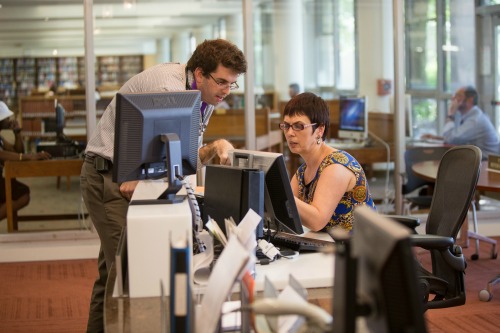
A recent Viewpoint column by Melissa L. Rethlefsen et al. in the Journal of the American Medical Association, “Engaging Medical Librarians to Improve the Quality of Review Articles,” examined the value medical librarians bring to the research process. Librarians’ expertise includes selecting databases, employing advanced search skills, refining topics, developing search strategies and managing results. Disappointingly, these skills are sometimes underused by medical students and established researchers; they either don’t understand the value of these tasks or believe they are already expert at searching.
The article caused me to reflect on the evolving relationship between librarians and researchers that I’ve experienced throughout my library career.
Before the Internet (remember those days?), clinicians needing the most-current medical information would have to search the printed Index Medicus. The first step in the process required identifying the appropriate medical subject headings (MeSH). This was not always straightforward. A researcher looking for articles on earaches, for example, would have to search under the term “otitis media.” Once relevant citations were found (after the searcher had pored over volumes of the Index Medicus), they were jotted down on scraps of paper. The next step required physically hunting down the actual printed articles.
The Dawn of the Information Age
In the 1970s, the MEDLINE database became available via dial-up modem. Its search syntax was complex and charges were incurred based on the computer’s connection time and the number of abstracts retrieved. To keep costs under control, not a second could be wasted. Irrelevant citations burned precious time and money. Working closely with clinicians and researchers, we would develop efficient search strategies in advance to home in on the best articles as quickly as possible. This was particularly exciting for me because it gave me a window into the world of the researchers. It was fascinating to hear them talk about their ideas and their research projects.
Things began to change with the introduction of the software known as Grateful Med. With its user-friendly look and feel, clinicians were finally able to search MEDLINE on their own. The PubMed search engine is now available for free all over the world on the Web and even on mobile phones and tablets. Full-text journal articles can be retrieved at the click of a button, though they may require subscriptions. Interlibrary loan provides access to articles that are not available at a researcher’s home institution.
Better Searches, Better Evidence
The focus on evidence-based medicine (EBM) has reinforced the importance of collaboration with librarians. Finding the best evidence and avoiding bias are key to medical research and investigation. That’s why proper searching involves more than just tossing a bunch of keywords into a search box.
When we teach MEDLINE or EBM workshops to students and faculty, we find that many participants feel that because they are experts in their fields, they are also expert searchers. The truth is, many are not. Upon further discussion, some will acknowledge that they often feel frustrated, finding too many or too few relevant results. The stakes are particularly high when it comes to patient care, and also when writing for publication. Review articles, especially systematic reviews, are daunting because the authors know that other clinicians could base their own medical decisions on these articles.
Search and Discover
One of my favorite “Aha!” moments is showing a researcher the MeSH “tree structure,” which illustrates relationships among terms and ranks concepts hierarchically from broad to extremely specific. This often causes the researcher to step back and say “I hadn’t looked at it that way—maybe it would be better to explore this topic from a broader perspective,” or “Maybe I should be more specific.”
In addition, sometimes researchers don’t think beyond PubMed or Google Scholar. Some topics lend themselves to more-specialized databases, such as Embase (for drug information), SciFinder (for chemistry) and CABI Global Health (for public health topics). Introduction to these resources opens up exciting new opportunities for discovery.
Making the Connection
Earlier this year, my colleague Aurelia Minuti worked with a team of students who wanted to conduct a systematic review. During their initial discussions of the topic, Aurelia advised them that their topic was too broad to lend itself to such a review. Working together over the course of several meetings, they were able to refine the question. Based on this revised question, Aurelia selected three databases to examine and developed search strategies to harvest relevant articles.
The students were so pleased with the search results that one of them sent her the following message: “Thank you, Mrs. Minuti, you are absolutely killing it for us!” Ah, a successful match between researcher and subject—music to every medical librarian’s ears!

